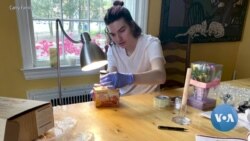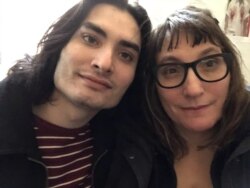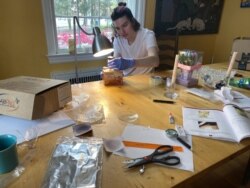Twenty-year-old Leo Canty says he was worried less about himself and more about the people around him when he tested positive for COVID-19, the illness caused by the coronavirus, in late March.
“The scariest part was that thought in my mind, that like hurting someone else, hoping that people I’ve been in contact with, specifically my family, were all OK,” the New York college student said via Skype from his home in Washington.
Canty lives with his parents and three siblings in the home, where he quarantined himself in his room. His mother, Michelle Cochran, also tested positive in early April.
“We were all quarantined to the house for two weeks. It was about four weeks, of all us inside the house, all the time, in different quarantines,” she said.
Social distancing at home
Cochran, a nurse practitioner, says she is certain she was not infected by her son but was exposed to the virus elsewhere, noting she tested negative for the virus after her son tested positive. Her employer wanted her to be tested before she could come back to work as well. And when her son Leo was recovering, her results came back positive.
During that time, to keep the rest of the family safe, the Canty family practiced strict social distancing at home. Cochran was confined to her room for almost two weeks, until she felt better, and seeing her family only through Zoom meetings.
At the same time her son Leo was quarantined in his room, while the rest of the family avoided physical contact like handshakes and hugs.
“A terrible feeling to feel like you are kind of toxic and that you could infect your loved ones. It's a really awful feeling,” she said.
Plasma donation & antibodies testing
Canty tested negative in mid-April. And in early May, he donated his plasma for potential therapy for both prevention and treatment in the fight against the coronavirus.
The college student said he was determined to do this, as health officials and those from the Centers for Disease Control and Prevention were in constant contact with him from the beginning.
“It seemed selfish not to. If there is any possibility of helping someone like it’s something you got to do. If you can help people, you should, It's just basic,” he said.
Dr. Arturo Casadevall chairs the Department of Molecular Microbiology and Immunology at the Johns Hopkins Bloomberg School of Public Health. He is leading a national effort to test whether the use of blood plasma from recovered patients might help prevent COVID-19 or lessen the chance of progression to this severe disease.
“Antibodies recovered from COVID-19 patients might be a potential therapy for both prevention and treatment in the fight against coronavirus until a vaccine becomes available”, said Dr. Casadevall during an online briefing
What are antibodies?
Antibodies are specialized proteins in the blood that are produced by the body’s immune system to help fight off a new infection. These proteins bind to the invading foreign bacteria or virus, then neutralize, destroy and ultimately remove it from the body.
What is plasma?
Blood plasma is the liquid part of blood, where antibodies can be found.
“So, if I was to take a sample of your blood, in it you got red cells, you got white cells, you got platelets, and they're floating on liquid. The liquid is the plasma. And that's where the antibodies are. The antibodies are floating in the liquid,” said Casadevall.
How it works
The Johns Hopkins researcher notes how antibodies can help treat other affected patients.
“Once a person recovers from a virus, in this case COVID-19, the antibodies that somebody else made, when they recovered, are transferred to another person, a patient. So, the new person gets them ready made and can use them right away,” he said.
Casadevall said since March 1, more than 7,200 people in the United States have been treated with plasma therapy and that number is increasing each day.
“In every epidemic in the past since 1900, in 1918, with the SARS epidemic, with the Ebola epidemic, physicians often reach out to use plasma because it is something that is available once you have survivors,” he said.
He notes the challenges in the process.
“One of the difficulties with this therapy is that we're all different. And let's say that, God forbid, we all have COVID-19 and that we all recovered. It turns out that we vary tremendously in the types of quality and quantity of antibodies in our blood,” said Casadevall.
That is why the protocols for collecting plasma are part of routine transfusion medicine, he added, and, “We are using the plasma that has the most antibodies because we think that that is the one that is more likely to be effective.”
Good news
Cochran is a registered bone marrow donor and all her children are blood donors. She says she wants to find out if anyone else in the family has antibodies so that person can donate his or her plasma for research.
The Canty family says they are happy they were able to help by providing Leo’s plasma, and that everyone is doing okay now.
“I feel incredibly fortunate that, knock on wood, we both recovered and nobody else has gotten sick,” his mother said with a smile on her face.
Leo’s father, Brendan Canty, says the experience has brought the family together.
“I think ultimately the experience probably will make us a much tighter family. It’s something that I have never expected to have - this much time together.”

















